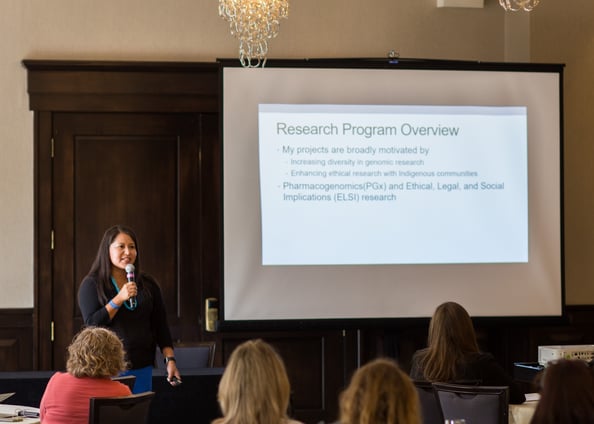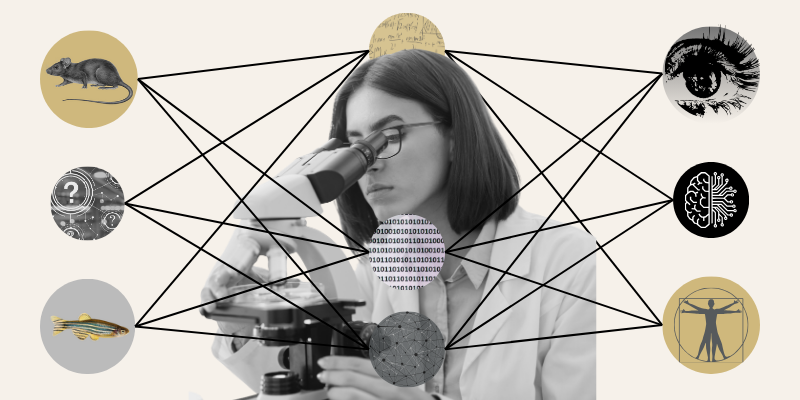The U.S. National Science Foundation (NSF) has granted Katrina Claw, PhD, assistant professor of biomedical informatics at the University of Colorado School of Medicine, the Alan T. Waterman Award, the nation’s highest honor for early-career scientists and engineers, for her contributions to science and dedication to diversity in the field.
She is one of three recipients this year and the first from the Navajo Nation.
“This award is such an honor,” Claw says. “I have to credit the support from my parents, who sacrificed a lot to see me succeed in this field, and to my mentors, many of which are faculty in our Department of Biomedical Informatics. They continuously inspire me, and I hope to do that for my own students, colleagues, and community.”
As part of the award, Claw will also receive a $1 million grant over the next five years to continue fostering cultural and bioethical research in Indigenous communities and leading pharmacogenomic research studies.
“I congratulate Dr. Claw, who has already made many extraordinary contributions to her field,” says NSF Director Sethuraman Panchanathan. “The Waterman Award is much more than just a recognition of achievements. This award represents the potential of the recipients to continue making groundbreaking contributions to science, technology, and our society. Dr. Claw and the other awardees also serve as unique role models who can inspire new generations of students from all backgrounds to pursue careers in science and engineering.”
Dedication to Indigenous genetic research
Throughout her career, Claw has established research partnerships and collaborations with multiple American Indian, Alaskan Native, and First Nations tribes and centers. Those partnerships have been crucial to her research, and now she hopes to sustain and create more meaningful connections with help from the award.
“One avenue I’m exploring with this grant is adding an individual to our lab that can help better engage tribal communities,” she says. “For me, I’m not trained in science communication or graphic and video design, and I’m not savvy with social media, which are ways community members often communicate. I’d really like to use this as an opportunity to hire someone who can offer these latest communication and science writing skills so we can create materials with our tribal collaborators. This is necessary and important because we want to be transparent in our research.”
Communication is key for the communities Claw and her lab work with. In 2002, just as Claw starting college, the Navajo Nation banned genetics research, citing concerns about historical distrust and how their people’s DNA is used. Almost two decades later, Claw is working with her tribe to address mistrust and form responsible policies surrounding genetic and genomic research.
Claw and her close collaborator Nanibaa’ Garrison, PhD, an associate professor at the University of California Los Angeles, were awarded a pilot grant in 2021 to create educational materials for increasing genetic literacy on the Navajo Nation. She and a team of community collaborators were able to create a glossary of over 250 genetic terms translated into the Navajo language. They also plan to finish five digital stories on various genetics-related topics by the end of the year.
“With community collaborators, we’re creating a cultural framework to help Navajo people think about genetics on their own terms,” Claw says.

Katrina Claw, PhD, assistant professor of biomedical informatics, gives a talk about her research. The NSF grant will allow the geneticist to continue diving deeper into her work in Indigenous communities. Photo courtesy of Daniel Suave.
An emphasis on communication and transparency carries into important scientific insights for Indigenous communities.
In 2021, Claw’s novel research revealed a strong association between nicotine metabolism and CYP2A6 gene variation in a tribally diverse Alaska Native population. Knowing this connection may help guide smoking cessation treatment in Alaska Native and American Indian populations, she says.
“Research into CYP450 genes can help us understand how we have adapted to our environments,” she explains. “It also gives us a sense of why we see different genetic variants or diseases in different populations, and then how we can address that using personalized medicine.”
This will continue to become important as our environment changes, Claw adds.
Prioritizing diversity to enhance the scientific field
Growing up on the Navajo Nation, Claw says she was a curious child and always had a book to read, but it wasn’t innately clear that she could have a career in scientific research.
In college at Arizona State University, she received a stipend to work in a lab part-time as a scholar in the Maximizing Access to Research Careers (MARC) program. From there, her interest in genetics grew, leading her to the work she does today.
“I was fortunate to have so many mentors at every stage,” Claw says. “I still keep in touch with many of the people who guided me through my undergraduate, postbaccalaureate, and PhD education.”
She hopes to continue that energy in her own lab by fostering diversity, equity, and inclusion.
“One of my overall goals is to help diversify science, and I start by doing that with the people who I work with,” she says. “I have three Indigenous trainees in my lab right now. They do amazing work and help us really connect to the tribes we’re working with and bring a crucial perspective to this work.”
Genomic and scientific research is becoming more diverse, something Claw says is a benefit to everybody.
“There are more initiatives that help promote diversity in the sciences today, and it’s beneficial to our work and community,” she says. “We’re seeing more infrastructural and systematic changes as people who were some of the first of their background reach a stage in their career where they’re in charge or hiring or setting important policies in place. I’m hoping that will contribute to more role models and we can make scientific research a more inclusive and diverse place. I also see community-driven research being an important component to successful research.”

.png)

.png)
